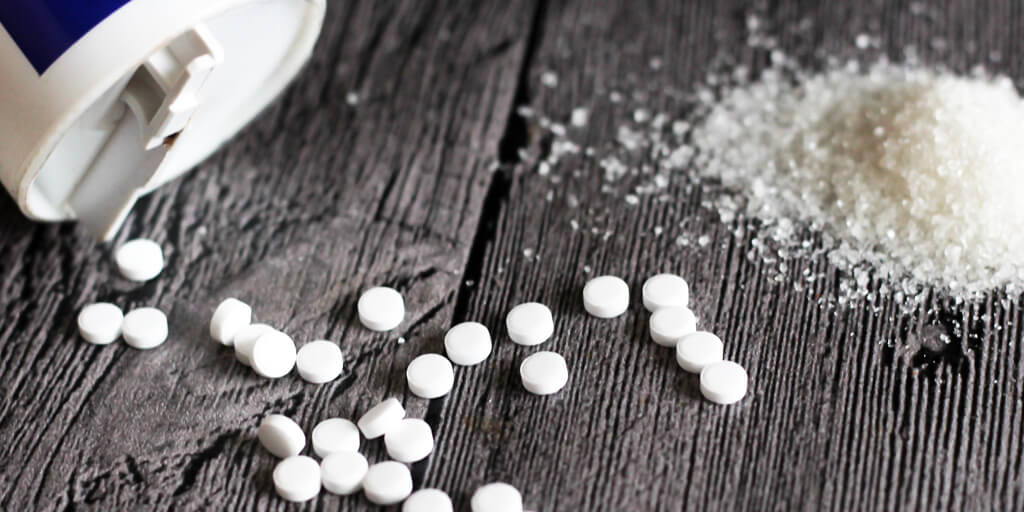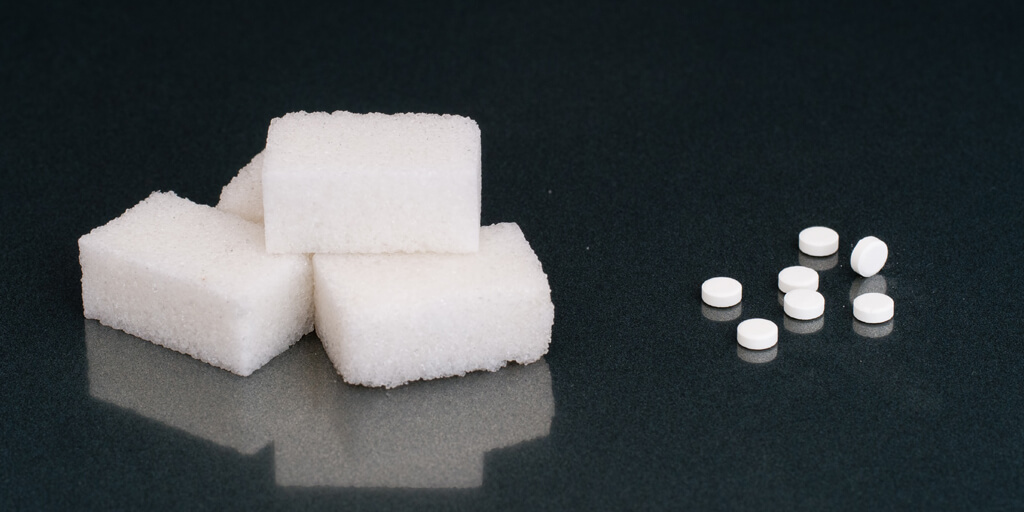In recent years, companies have been switching to artificial sweeteners, in the hopes of pleasing sugar-wary customers.
But are you just trading one concern for another?
The most widely used artificial sweetener types are aspartame and acesulfame potassium. Similarly, Neotame, saccharin and sucralose are also used. Most of these substances have alternate names so you may have to look closely to find them on the label of foods and beverages.
- Aspartame: NutraSweet, Equal
- Acesulfame Potassium: Sunett, Sweet One
- Neotame: NutraSweet (7,000-13,000 times sweeter than sugar!)
- Saccharin: Sweet'N Low, Sweet and Low, Sweet Twin, Necta Sweet (200-700 times sweeter than table sugar!)
- Sucralose: Splenda, Zerocal, Sukrana, SucraPlus

What are the Negative Effects of Aspartame?
Aspartame has become one of the most controversial artificial sweeteners. It is used in various products and consumed by tens of millions of Americans every day. Aspartame is made by joining phenylalanine and aspartic acid together. These are amino acids found naturally in the body and in foods. The body breaks down aspartame into methanol. As a result, aspartame has been subjected to extensive research and studies, as methanol can be toxic in high levels.
Methanol is a toxic substance for the human body. Especially when you consume it in substantial quantities, over long periods of time. Many scientists and doctors say that methanol can even be toxic in relatively smaller quantities. For instance, if the absorption is high. Consuming aspartame will increase the availability of free methanol in the body.
Our system converts methanol and breaks it down to formaldehyde.
Formaldehyde is a neurotoxin and a carcinogen.
There are many potential negative effects of aspartame and yet manufacturers have approval to use the ingredient in many nations. Surprisingly, it has been approved by the U.S. Food and Drug Administration, World Health Organization, and the United Nations Food and Agriculture Organization.
As far as those looking to lose weight, aspartame seems like a great solution.
All the sweetness you want with zero calories?
Unfortunately, studies haven't been able to show that aspartame helps with weight loss at all.
Weight gain and obesity are common problems for those who routinely consume foods and beverages containing this artificial sweetener.

Top 5 Common Items That Use Aspartame
Scores of foods and beverages contain aspartame. The most common items are:
- Diet sodas
- Hard candies
- Sugar-free products
- Jellies and jams
- Nutritional bars
The market today is flooded with synthetic sweeteners as consumers move away from sugar. There is still demand for sweetened goods, however.
See a product on the shelf labelled SUGAR FREE?
What you don't know is…
Aspartame is used in various sugar free products including:
- Yogurt
- Ice cream
- Spreads (butter, margarine)
- Cookies
- Sauces (ketchup, bbq sauce)
- Cocoa mixes
- Chewing gum
Even vitamins have been found to contain aspartame…
Other medications also have aspartame on the list of ingredients, supposedly to make them more palatable.
Health drinks aimed at those looking to sneak in more daily veggies also contain aspartame. Processed foods and drinks contain artificial sweeteners and aspartame is a popular choice for manufacturers. When you see products being labeled as sugar free and fat free, it's usually too good to be true. You can be certain there are artificial sweeteners in them and aspartame dangers may be among them.

Will Aspartame Help Me Lose Weight?
Artificial sweeteners are often marketed and even recommended by some doctors to manage diabetes. Some recommend it as an alternative to sugar for those who want to lose weight. Due to the risks of potentials aspartame dangers, this may not be the best alternative. Diabetics have to avoid sugar or limit intake to the minimum. Those looking to cut calories often turn to zero sugar products. Artificial sweeteners are supposed to help satisfy the craving for sugar. However, they do not necessarily help in the management of diabetes and weight loss.
Aspartame is two hundred times sweeter than natural sugar. Only a bit of the ingredient can make a food or beverage taste sweet. Yet, most manufacturers use a lot of aspartame in their products.
An excessive intake of the artificial sweetener confuses your body.
What makes it confusing?
Natural sugar is broken down by insulin. The hormone regulates the amount of glucose in the blood. On the other hand, aspartame can cause an enhanced blood insulin and glucose response. As a result, more of it will continue to remain in the blood. The artificial sweetener will not be broken down readily. Even when aspartame is broken down, it turns into methanol. Over time, absorption of such toxic elements is not healthy.

It will definitely boost your weight loss to cut out sugar.
As far as whether you can occasionally enjoy a diet soda…
Potential aspartame dangers start to be concerning after years of excessive use. While it won't undo all your hard work, you should still avoid aspartame as much as possible.
The same rule applies to diabetics. We just cannot keep on consuming hundreds of milligrams of aspartame and expect our bodies to keep up. Managing blood glucose takes work and sweets can throw you for a tail spin. Keep in mind, diabetics should always consult their doctor before making any switch to regulate their sugar intake. Similarly, the same goes for people trying lose weight.
A good start is to keep your daily intake to the minimum. Artificial sweeteners may trigger insulin resistance. They also can confuse the body, if they're not calorie free. Managing diabetes and losing weight are just not compatible with artificial sweeteners.

Natural Alternatives to Sugar and Aspartame
For many reasons, it's best to avoid excess sweets and that includes aspartame. There are natural alternatives to sugar and aspartame. The next time your sweet tooth is call you, consider:
- Stevia
- Agave nectar
- Honey
- Molasses
- Maple syrup (all natural; no high fructose corn syrup!)
Keep in mind, these still should be enjoyed in moderation. Any food or drink that is rich in sugar, natural or artificial, can contribute to weight gain. Another good strategy is to reach for a piece of fruit to satisfy your craving. Sugar or aspartame laden goodies may be tempting, but are usually not worth it.
Can Aspartame Consumption Lead to Cancer?
American Cancer Society recommends a daily intake of no more than fifty milligrams of aspartame or other artificial sweeteners for every kilogram of weight. The FDA has the same recommendation.
For reference, a typical diet soda has nearly two hundred milligrams of aspartame.
This means, for a person weighing hundred and fifty pounds (around sixty eight kilograms) could drink approximately 15 cans of soda a day.
That may seem outrageous…
Remember that aspartame is in tons of other foods you may be enjoying throughout the day. Unfortunately, the modern diet sometimes contains a tad too many processed foods. You may think you're coming in under the limit by avoiding soda.

Actually, you might be sabotaged by aspartame lurking in your snacks and vitamins!
Consuming more than fifty milligrams of aspartame per day per kilogram of weight can lead to toxicity. There can be immediate, short term side effects and long term repercussions.
Aspartame is not recommended for those who have phenylketonuria. Those with PKU need to avoid aspartame, as it can cause a rapid increase in the brain levels of phenylalanine.
The worry that artificial sweeteners can cause cancer stems from how the body process it. After aspartame breaks down in the body, it's methanol. Formaldehyde, the derived substance after methanol is broken down by the body, is a known carcinogen. A carcinogen is a substance that can cause or facilitate the growth of cancer.
There is no definitive research concluding that aspartame can cause cancer. However, several lab and human studies have shown there to be a substantial risk. In other words, excessive consumption of aspartame is definitely toxic. Exposing your body to known carcinogens is never a good idea. Internal toxicity may lead to different types of cancers, especially in those who are already at a high risk.

Are Artificial Sweeteners Harmful?
There's just no beating around the bush; there is not an upside to aspartame.
At best?
You enjoy a zero calorie snack that is chemically super sweet.
At worst?
Over consumption will repeatedly expose your body to developing issues from aspartame dangers.
Most studies point to artificial sweeteners being harmful. Further, they have no health benefits. The only purpose of aspartame and other artificial sweeteners is a sweet taste. Sometimes the taste isn't even enough and can cause people to crave even more as a result.
It may seem difficult to imagine a world without sugar and artificial sweeteners. Many natural alternatives to sugar and aspartame such as honey are more expensive options. Manufacturers cannot possibly replace aspartame with honey or other natural alternatives if they want to keep costs low. Simply put, it's just not in their best interest to hurt their profit.
The takeaway is that we must all exercise moderation. Aspartame may not cause much harm when consumed as little as possible. It is best to avoid foods and drinks that contain a lot of artificial sweeteners. It is unlikely for regulatory authorities to change their policy towards artificial sweeteners. As a result, consumers have to proactively limit the daily intake and preferably avoid aspartame entirely.
Do you avoid aspartame in your daily diet? Let us know your go-to natural sweetener in the comments below!




Comments
Loading…